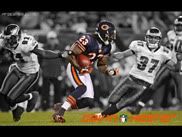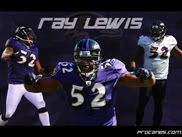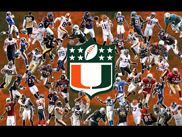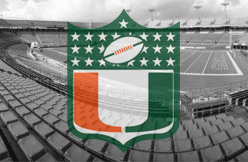CLICK HERE TO ORDER!
26 October 2008
Portis, Beason capture NFC monthly awards
Oct/31/08 07:58 AM Filed in: Clinton
Portis |
Jon
Beason

Portis rushed for an NFL-best 575 yards during the month, averaging 143.8 yards per game, to capture the offensive award and help Washington to a 3-1 mark for October. He accumulated at least 120 yards in all four games and has a streak of five consecutive games with at least 120 yards, doing so for the second time in his career to join Hall of Famer O.J. Simpson as the only players to accomplish the feat twice.
Beason earned the defensive honor by leading the Panthers with 37 tackles and two interceptions in October. He notched 15 tackles in a game against Tampa Bay and last week returned an interception 44 yards to help the Panthers complete a 3-1 month with a 27-23 win over Arizona.
(sportsnetwork.com)
Texans WR Johnson named AFC offensive player of month
Oct/31/08 07:58 AM Filed in: Andre Johnson

Johnson led the NFL with 41 receptions for 593 yards in four games, and also scored two touchdowns. He had 11 more catches and nearly 150 more yards than the AFC's next-closest receivers. He also led all AFC players in total yards from scrimmage in the month, even without making a single rushing attempt.
During the month, Johnson caught nine or more passes and had at least 130 receiving yards in all four games. He became just the third player in NFL history to catch 10 or more passes in three straight games and the fourth player ever to record 130 or more yards in four consecutive outings.
Johnson's 41 receptions were the second-most in the month of October since the 1970 AFL-NFL merger. Buffalo WR Eric Moulds had 42 catches in October 2000, but played five games. Johnson's 593 receiving yards were the fifth-most since 1970, surpassed only by St. Louis' Isaac Bruce (650 yards, 1995), Green Bay's James Lofton (606, 1984), Moulds (605, 2000) and Indianapolis' Marvin Harrison (603, 2000).
(chron.com)
Buffalo Bills' Parrish says he's ready for bigger role
Oct/31/08 07:57 AM Filed in: Roscoe
Parrish
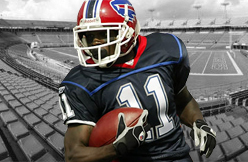
"I don't know Josh Reed's status, but I'm always here," Parrish said Sunday after learning that Reed would miss some time after suffering ankle and Achilles' tendon injuries in the 25-16 loss to the Dolphins.
"I always want a bigger role on offense. That's what I came in for, not to be a special teams player. I don't want to start a conflict, but I want to have more on offense and do what I do which is make plays and do whatever I can to help the team."
After running with the first string the past two days while Reed has watched practice wearing a protective boot on his foot, Parrish did not back down on his request to become more involved in Buffalo's offense.
"I don't want to make an issue about it, we're winning games and we're doing good," he said. "But you don't have to do special things to utilize me. I heard before you have to use gadget plays, but it's not true. I run routes, I do everything. Just call my play."
Whether that will start happening more frequently come Sunday — when the Bills play host to the New York Jets and Reed won't be on the field — is uncertain, but quarterback Trent Edwards sure likes the fact that Parrish has expressed his opinion.
"I'd expect a guy like Roscoe to say that," Edwards said.
"I want to have receivers in my huddle that want the ball. I'm very happy that you told me he said that. That's what I respect about Roscoe Parrish and hopefully we can do that on Sunday."
Parrish has established himself as one of the NFL's premier punt returners, but his contributions on offense have been limited given his status as a second-round pick in the 2005 draft.
In his first three seasons the 5-foot-9, 168-pounder had 73 catches for 820 yards and 4 TDs, and this year he has tacked on only 10 receptions for 82 yards and 1 TD.
He has one career 100-yard receiving game — against the Jets in 2006 — and he has three six-catch games, but his highest yardage total in those was only 56 yards. Among his 83 catches, only four have gone for 40 or more yards which is perplexing considering his big-play ability.
Asked if it's difficult to get Parrish the ball in spots where he can do something with it, primarily because of his size, Bills coach Dick Jauron neatly sidestepped the issue by saying, "We definitely have plays for Roscoe. Size-wise, clearly Roscoe plays in a league of big men and he succeeds. He really performs well in this league in whatever he does."
Edwards was asked the same question, and he said it's more a function of him getting in sync with Parrish, which is tough to do because he doesn't get as many practice reps as Lee Evans and Reed.
"The thing with receivers is that you have to get in rhythm with them and I'm slowly coming around with Lee, I'm slowly working around with Josh, and it comes with a lot of repetitions and game repetitions," he said.
If Parrish gets the start in place of Reed, rookie James Hardy will be the No. 3 receiver, and like Parrish, Hardy has been largely invisible on offense thus far, though being a rookie gives him special dispensation. Hardy has just seven catches for 66 yards and one touchdown.
"The thing that held me back the most is that most of the stuff I've learned here, I hadn't learned at Indiana," Hardy said. "I have so many things being thrown at me at once and I have to pick my poison to see what I need to get better at in each category. I can't do it all at once, but it's starting to come."
The Bills need both players to produce because without Reed, things are only going to get more difficult for Evans. Evans leads the Bills with 31 catches, and his 20.5-yard average is tops in the NFL among receivers with at least 20 receptions.
However, he's going to get blanket coverage with Reed out, and it's not going to stop unless Parrish or Hardy can pull some defensive attention their way.
"We know we have to pick it up," Parrish. "We know what we have to do with Josh down. Lee is a big part of our offense. Whenever a ball comes our way, we have to do what we can do. We want to make plays."
(democratandchronicle.com)
Moss is 'must see' player for Redskins fans
Oct/31/08 07:54 AM Filed in: Santana Moss

He is expected to play Monday night against the Steelers - after all, Moss is arguably the most indispensable player on the roster.
"It would be very hard," Redskins coach Jim Zorn said to imagine playing without Moss. "You would lose all that run-after-the-catch, the quick escapes."
Zorn paused, shook his head and added: "That would really hurt us. Don't even talk about that."
Moss scored both of Washington's touchdowns in Sunday's 25-17 win over Detroit, one on a 50-yard reception and the other on an 80-yard punt return. It was only his second punt return of the season and the only time he touched the ball all game on special teams, yet the runback was so compelling, it was deemed worthy of the NFC award.
"I think everybody should get up off their seats when you see him on the field," Zorn said, "because he's a tremendous athlete. Is he doing the extraordinary? He's kind of playing to his ability. He really is."
Moss hasn't returned punts regularly since his four-year stint with the New York Jets before coming to the Redskins in 2005, so winning a special teams award wasn't at the top of a list of predictions for 2008. He was offered several congratulations during an interview Wednesday outside the locker room - and accepted them in stride.
"That's why I never predict at the beginning of the year," Moss said. "You never know what can happen. I don't make goals. I leave it wide open for anything to happen."
Moss said he didn't lobby to return punts, but he did plant the seed in the coaches' minds earlier this season. Regular returner Antwaan Randle El's numbers have been average at best, so putting Moss back there once a game seemed a good way to provide a spark.
It certainly worked against the Lions, who trailed by only six before Moss' fourth-quarter return.
"Randle El is our punt returner," Zorn said. "But every once in a while, we like to see Santana return a punt."
Moss' value as a receiver is even greater, because the drop-off would be huge if he couldn't play. Moss (40) and Randle El (33) account for all but 12 of the catches made by Redskins wideouts this season.
Moss' 658 receiving yards rank fifth in the NFL, a considerable achievement given how much attention he gets from defenses. He was double-teamed and had zero catches against Philadelphia earlier this month and had only two the following week against St. Louis - but he's also had three games of 140-plus yards and four games with at least seven catches.
Since his arrival in Washington, Moss has maintained that statistics don't determine the best receiver, so it would be hypocritical of him to harp on numbers. Asked to explain his "I never make goals" proclamation, Moss said it came from his younger days when his stats didn't measure up to those of another receiver.
"So what I always told myself is you can't judge me because he had more yards," Moss said. "You can't say he's a better receiver than I am - that's what his team allowed him to do. All I want to do is do what my team allows me to do. If my team allows me to catch that many yards, then I should have it.
"Just because this guy (had) a zillion catches, that doesn't mean he's the best receiver in the league. That just means he's just had a better year stats-wise. But did his team win the championship? Did his team go to the playoffs? How big was his role in the team's success?"
(pittsburghlive.com)
Patriots' Wilfork fined; hit on Cutler did not show intent, source says
Oct/30/08 09:17 PM Filed in: Vince Wilfork

Wilfork met with NFL commissioner Roger Goodell in New York on Wednesday, and Goodell decided to forgo a possible suspension. The Associated Press, citing a person familiar with the case, reported that Wilfork instead would be fined.
Wilfork was summoned to meet with Goodell after the Broncos claimed that tape of New England's 41-7 victory Oct. 20 showed Wilfork elbowing Cutler in the helmet.
Wilford was not suspended because video of the incident did not show intent, a league source told ESPN senior NFL analyst Chris Mortensen.
(espn.com)
Phillips is getting the picture
Oct/30/08 09:15 PM Filed in: Kenny
Phillips
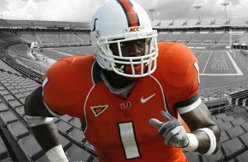
He’s learning to hate the Dallas Cowboys, too.
“I wasn’t very aware, but when I got here I found out very quickly,” Phillips said. “I guess I was just drafted into it.”
He’s noticed a different level of intensity.
“They hate ’em,” Phillips said of his teammates. “Nobody likes Dallas. You can tell the way guys are practicing, the way guys are carrying themselves this week. You can tell there’s something special about Dallas these guys just don’t like.”
(giants.lohudsblogs.com)
Burrell's first Series hit huge
Oct/30/08 09:13 PM Filed in: Pat Burrell

"I was just trying to make good contact," Burrell said. "We needed a baserunner and I just wanted to get on."
That, of course, is easier said than done. Burrell came to the plate to lead off the seventh inning of Game 5 with the score tied and locked in an 0-for-12 World Series slump. He had two walks in this game, but those came back Monday, when rain suspended action after 5 1/2 innings.
Now, two days later, Burrell had a chance to ignite his team in a way he had only dreamed about a decade ago when the Phillies made the University of Miami power-hitting third baseman the No. 1 pick overall in the 1998 draft.
"Everybody made a lot of him not getting any hits but he's had some big at-bats and good at-bats in this series," said close friend Jason Michaels, who in 10 days will get married with Burrell at his side after a decadelong friendship that began on that Miami team and continued after he was drafted on that same day as Burrell by the Phillies several rounds later. "I've seen him get big hits my whole life. I felt this one coming."
Michaels, now with Pittsburgh, saw it coming as did 45,000 or so others as Burrell crushed a J.P. Howell offering off the wall in center field to get things going. Eric Bruntlett came in to pinch run and later scored the game-winning run as the Phillies beat Tampa Bay 4-3 to secure a World Series title Wednesday.
Burrell has had his ups and downs over the years, but no low was ever as extreme as this high.
"My wife told me, not today but the other day before the game that Pat was going to get a big hit," Eyre said. "Wow, for your first hit to be that one, in the World Series, unbelievable."
"This isn't about one guy and no one knows that better than Pat," second baseman Chase Utley said. "It's about the team and no one knows that better than Pat. So who better than Pat to get that hit?"
"It's hard to explain how this felt," said Burrell, who went 10-for-44 for a .227 average in the playoffs, but nobody had eight more important RBIs than he did over 14 games. "It's been so long. I've seen it all in this town and I love this town and it's just an amazing feeling to get this done."
Burrell has been different this year. He's been reflective, as this is almost certainly his final season with the Phillies. Despite good numbers during the season and a great postseason, the left fielder will most likely move on when his contract is up after this year. While negotiations will certainly be conducted, Burrell's final moment may have been that double and the eventual game-winning run.
"I don't know how this is all going to run out," Burrell said. "I'd love to stay but that's not to talk about now. Let's just enjoy the moment."
A moment that no one waited longer for to come and certainly, a moment that Burrell will never forget.
(courierpostonline.com)
Cora Files for Free Agency
Oct/30/08 09:12 PM Filed in: Alex Cora

Cora has stated a desire to return to the Red Sox in 2009 while it’s unlikely the Red Sox will re-sign Kotsay, Byrd, Schilling and Timlin.
(soxanddawgs.com)
1st Base Opens Up For Sanchez
Oct/30/08 09:12 PM Filed in: Gaby Sanchez
With Jacobs gone, the path is clear for prospect Gaby
Sanchez to take over. Sanchez made his major league
debut in September after winning Southern League Most
Valuable Player honors. Jorge Cantu also showed last
season he's a capable first baseman and the Marlins
have veteran Wes Helms backing up at both corner spots.
(sun-sentinel.com)
(sun-sentinel.com)
Andre Johnson Could Make NFL History on Sunday
Oct/30/08 01:05 AM Filed in: Andre Johnson

(ffmastermind.com)
Saints Sign Tanard Davis
Oct/30/08 01:05 AM Filed in: Tanard Davis

(theadvertiser.com)
NFL @ halftime MVP race

8. Ed Reed, S, Ravens. Always a playmaker of the highest order and someone opponents must locate on every snap, it’s Reed’s outstanding range that allows the creativity defensive coordinator Rex Ryan flashes. He also gets a checkmark in the “guts” category for playing through hamstring and thigh injuries. Every coach who faces the Ravens mentions Reed early and often. Baltimore is second in total defense, third in pass defense and first in run defense. Reed is the primary reason.
6. Clinton Portis, RB, Redskins. Sshhh … Portis is on a pace to rush for nearly 2,000 yards. Somehow, in all the hoopla over Jason Campbell—he’s been outstanding, so he does deserve it—Portis’ career year is getting overshadowed. Portis has 944 yards at 5.0-per clip and 11 catches to boot. The reason he gets the call here over Campbell is because the Redskins’ offensive identity is one of a physical, grinding group that wears out opponents. As a side note: How loaded was that University of Miami title team in 2001? Johnson, Reed and Portis are on this list, and that’s without mentioning Vince Wilfork, Jonathan Vilma, D.J. Williams, Willis McGahee, Frank Gore, Bryant McKinnie.
(sports.yahoo.com)
CNNSI Mid Year Review
Oct/30/08 01:05 AM Filed in: Andre Johnson
| Clinton
Portis

Offensive player of the year: Clinton Portis, Washington, RB -- Though I have my doubts that Portis can continue to carry so much of the load for the Redskins, you can't overlook the contributions of a running back who's leading the league in rushing by a whopping 260 yards, and averages 118.0 yards per game. Portis has scored in five of Washington's eight games, and he has at least 96 yards rushing in six of eight, including 121-plus in his last five.
(cnnsi.com)
Portis Works on His Karate Kick
Oct/30/08 01:00 AM Filed in: Clinton
Portis

"I've been working on my karate kick all week long," he said. "I mean, it's a tough team, it's a sound team." I have no idea what that meant.
At the beginning of his weekly availability, Portis was joking with the media members about how he received nothing more than an "attaboy" from Zorn for getting Offensive Player of the Month honors, and then I guess someone must have asked him if he was rewarding his blockers for all his accolades. Then Mike Sellers walked by.
"Mike Sellers got some bling, some big-time bling," Portis said.
"My boy took care of me," Sellers confirmed.
"I'm talking about shiiiin-ing," Portis said. "He got some big-time bling."
"That's love right there," Sellers said.
"Maybe one day he'll show you guys," Portis said. "But as far as the other guys, that's what they're supposed to do."
Someone asked Portis what sort of bling he had gotten for Sellers; "bling bling," Portis said, making me realize for the first time that "bling bling" was an adjective-noun combination.
And someone else asked why blocking wasn't what Sellers is "supposed to do."
"You've got to baby Mike," Portis said. "I'm trying to get Mike to hold his head up. We're trying to get him one of those neck things that'll keep it up."
Then he started answering questions about the Steelers, which, aside from the karate kick promise, seemed dull by comparison.
(washigtonpost.com)
Baraka Atkins To Enter DLine Rotation
Oct/30/08 12:58 AM Filed in: Baraka Atkins
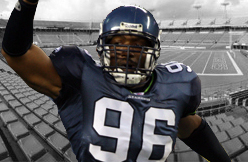
The Seahawks are obviously going to miss the effort that Kerney brings to the field every week. However, defensive end is a position the team is somewhat deep at. Kerney's talent is replaceable, but his effort is rarely matched. Jackson and Tapp will be the main players at defensive end in the upcoming game. Both have a lot to prove, as does Atkins, who will be active for just the second time this season.
(seahawksaddicts.com)
After 13 years, Ray Lewis still 'amazing to watch'
Oct/30/08 12:57 AM Filed in: Ray Lewis

One thing, however, has remained constant throughout his brilliant 13-year career: Lewis taking charge in the middle of a stout Baltimore Ravens defense.
Lewis is the leading tackler on the second-ranked defense in the NFL, and his contribution goes well beyond mere statistics. He is the unquestioned leader on the field and in the locker room, whether it be barking orders on a third-down play, organizing film-study sessions or answering questions from an inquisitive rookie.
"He does more than any player I've been around," Ravens defensive coordinator Rex Ryan said Wednesday. "He just loves the game. I know he's a talented guy that can do a lot of things in life, but I can't see him ever not doing football. He puts everything he's got into it. It's amazing to watch."
Lewis is 33, yet he still plays middle linebacker like the 21-year-old rookie drafted out of Miami in 1996. It's hard to imagine, but this version of Ray Lewis might be even better, because the experience he's gained outweighs any physical shortcomings that come with 13 years of exchanging blows at one of the most demanding positions on the field.
When Lewis came into the league, he depended primarily on his instincts to make plays. Now, he supplements his talent with rigorous offseason preparation and hours of film study.
"I think I've grown in so many areas. I don't think I can explain them all," Lewis said. "I think every year you gain a level of wisdom. That's the game of football."
Lewis has led the Ravens in tackling in six of seven games this season. He also has a sack, has knocked away five passes and forced a fumble. That only begins to explain his importance to a young defense that listens to Lewis as readily as Ryan or head coach John Harbaugh.
"He's flying around like he did 10 years ago, when I first got here," Ryan said. "He enjoys playing with the guys, leading the guys. Heck, leading me and everybody else. He's a special guy."
During the early years of his career, Lewis relied upon veterans such as Rod Woodson and Shannon Sharpe for guidance. Now he's the one doling out advice, doing his part in the NFL version of the circle of life.
"Me being in that position, I'm more of a tutor to a lot of the younger guys, trying to teach them about the game," he said. "My offseason is always preparing for when the games come. That's the fun part. Then you just raise the young guys to always play on a high level. The game just continues to get better and better as you get older."
And so, incidentally, does Lewis.
"I can't ever see him getting old," Ryan said.
As an assistant coach with the Philadelphia Eagles, Harbaugh developed a lofty opinion of Lewis by viewing film and watching him play on an occasional Sunday. Now that he sees Lewis on a daily basis, he's even more amazed.
"Here's a world-class athlete, a Hall of Fame type of athlete, you kind of wonder what makes a guy like that tick. The thing I've been so impressed with is his work ethic," Harbaugh said. "I mean, this guy does it all. He does it in the physical side in the offseason, he practices hard, he studies tape. Everything you ever heard about Ray Lewis is true."
Not exactly. Ravens rookie defensive back Haruki Nakamura formed his own opinion of Lewis before arriving at camp, then quickly found out that he was dead wrong.
"When you come in here as a rookie, especially as a defensive player, you know Ray Lewis is a big, tough, mean football player," Nakamura said. "Then you see him in person, and he's one of the classiest guys you'll ever meet and one of the best teammates you'll ever have."
The way Lewis is playing this season, he's got an excellent chance of being selected to play in the Pro Bowl for the 10th time. By the time he quits, that number could easily exceed a dozen. How much longer can he go?
"Easily another three or four more years," he said, "but it's going to take care of itself however it comes out. ... Life is freaking incredible, and loving football is what I do."
Given that he enjoys teaching and sharing life lessons with younger people, Lewis might make a good coach after he finally decides to retire. Then again, those traits could serve him well in a different avenue of life.
Asked about plans after football, Lewis replied, "I'll be coaching my kids."
(iht.com)
VINCE WILFORK WILL BE FINED, NOT SUSPENDED
Oct/30/08 12:56 AM Filed in: Vince Wilfork
A league source tells PFT that Patriots defensive tackle Vince Wilfork will be fined but will not be suspended after meeting Tuesday with NFL Commissioner Roger Goodell.
Per the source, Goodell had suspension on his mind heading into the meeting but came out of it convinced that Wilfork understands the league’s focus on player safety.
Wilfork was summoned to the league offices because of several incidents in which he appeared to be trying to injure opponents, most recently a late hit on Broncos quarterback Jay Cutler.
(pft.com)
Redskins' Moss wins special teams award
Oct/30/08 12:55 AM Filed in: Santana Moss

His 80-yard punt return for a touchdown helped lead the team to victory against the Detroit Lions. Moss has won the offensive player of the week award three times as a Redskin, and won AFC special teams player of the week when he was with the Jets in 2002.
(inrich.com)
No happy returns for Hester
Oct/30/08 12:54 AM Filed in: Devin Hester

The third-year wide receiver and Pro Bowl returner has gone all seven games this season without taking into the end zone.
His last TD return came on a kickoff against New Orleans in the 2007 season finale.
"I kind of put all the pressure on myself and say that it is kind of my fault that the return game is not the way that (it was)," Hester said Wednesday as the Chicago Bears, coming off a bye, got ready for Sunday's game against the Detroit Lions at Soldier Field.
"I put all pressure on me because at the end of the day, I'm the one with the ball in my hands. I have to be the one to figure it out and pick up the slack. If something breaks down, that's why they rely on me," he added.
"As far as the return game, I have to be the one to step up and make big plays. It hasn't been the way it's been, so I kind of take some of the blame for it."
Hester is two TD returns short of Brian Mitchell's NFL career record of 13 regular-season TDs on punts or kickoffs. Hester actually has 13 total returned kicks for scores, but one came on a missed field goal and the other was a postseason kickoff return to open the 2007 Super Bowl.
Hester hasn't had a punt return longer than 9 yards since the opener. His long kickoff return is 51 yards against Philadelphia, and he hasn't had another longer than 28 yards.
"The type of career he has had so far, he assumes he is going to score every time he touches the football," Bears coach Lovie Smith said.
"I can see why a guy like that would think that way, but it has been a lot more than just Devin. We need to do some things to help him out - mainly, block better to give him more opportunities. It's just a matter of time. The second half of the season, Devin like the rest of our football team, can make a lot of improvement and I expect that to happen."
The Bears' return teams had a facelift in the offseason, and the loss of Pro Bowl special teams star Brendon Ayanbadejo to the Baltimore Ravens in free agency took a toll on returns. Injuries have also played a role.
Hester bruised ribs in a Week 2 loss at Carolina and missed the Week 3 loss to Tampa Bay. He suffered a bruised quad muscle in the Bears' last game, a 48-41 win over Minnesota.
Hester is playing extensively at wide receiver for the first time after receiving a $40 million contract extension at the outset of training camp. He has 18 catches and has become more of a threat, but it has led to speculation he is too tired to succeed in the return game.
"To be honest, I'm not tired when it's time to return kickoffs and punts, so I wouldn't say that's a reason why it's not like that," Hester said.
The Bears maintain Hester has helped in the return game despite his lack of breakaway runbacks. Most opponents squib kick or kick off high away from him. As a result, the Bears are fourth in the NFL in starting field position after kickoffs at the 29.3-yard line.
(kentucky.com)
Moss might be Redskins' most indispensable player
Oct/30/08 12:52 AM Filed in: Santana Moss

The nimble Washington Redskins receiver, who on Wednesday became the unlikely recipient of the NFC special teams player of the week award, was given the day off because of a slightly strained hamstring.
He's expected to play Monday night against Pittsburgh — after all, Moss is arguably the most indispensable player on the roster.
How much so? Coach Jim Zorn literally shuddered when asked to imagine life without Moss.
"It would be very hard," Zorn said. "Because you lose all that run-after-the-catch, you lose the quick escape. We've put him a little more inside and out, so he's playing different sets from different positions."
The coach paused, shook his head and added: "That would really hurt us. Don't even talk about that."
Moss scored both of Washington's touchdowns in Sunday's 25-17 win over Detroit, one on a 50-yard reception and the other on an 80-yard punt return. It was only his second punt return of the season and the only time he touched the ball all game on special teams, yet the runback was so compelling, it was deemed worthy of the NFC award.
"I think everybody should get up off their seats when you see him on the field," Zorn said, "because he's a tremendous athlete. Is he doing the extraordinary? He's kind of playing to his ability. He really is."
Moss hasn't returned punts regularly since his four-year stint with the New York Jets before coming to the Redskins in 2005, so winning a special teams award wasn't at the top of a list of predictions for 2008.
Moss was offered several congratulations during an interview Wednesday outside the locker room — and accepted them in stride.
"That's why I never predict nothing at the beginning of the year," Moss said. "You never know what can happen. You just stick to what you do and put your best out there. I don't make goals. I never make goals. That's why I leave it wide open for anything to happen."
Moss said he didn't lobby to return punts, but he did plant the seed in the coaches' minds earlier this season. Regular returner Antwaan Randle El's numbers have been average at best, so putting Moss back there once a game seemed a good way to provide a spark.
It certainly worked against the Lions, who trailed by only six before Moss' fourth-quarter return.
"Antwaan Randle El is our punt returner and, every once in a while, we'd like to see Santana come in and return a punt," Zorn said. "I'm hoping to
do that at some point each game."
Moss' value as a receiver is even greater, because the drop-off would be huge if he couldn't play. Moss (40) and Randle El (33) account for all but 12 of the catches made by Redskins wideouts this season.
Moss' 658 receiving yards rank fifth in the NFL, a considerable achievement given how much attention he gets from defenses. He was double-teamed and had zero catches against Philadelphia earlier this month and had only two the following week against St. Louis — but he's also had three games of 140-plus yards and four games with at least seven catches.
Since his arrival in Washington, Moss has maintained that statistics don't determine the best receiver, so it would be hypocritical of him to harp on numbers. Asked to explain his "I never make goals" proclamation, Moss said it came from his younger days when his stats didn't measure up to those of another receiver.
"So what I always told myself is you can't judge me because he had more yards," Moss said. "You can't say he's a better receiver than I am — that's what his team allowed him to do. All I want to do is do what my team allows me to do. If my team allows me to catch that many yards, then I should have it.
"Just because this guy caught for a zillion yards or caught for a zillion catches, that doesn't mean he's the best receiver in the league. That just means he's just had a better year stats-wise, but did his team win the championship? Did his team go to the playoffs? How big was his role in the team's success?"
(iht.com)
Rest assured, Portis has been the MVP so far
Oct/30/08 12:50 AM Filed in: Clinton
Portis

Portis' act goes against football machismo, which suggests players are never supposed to openly display fatigue, but he doesn't care. He actually likes looking tired, then proving he's not. And he and the Redskins -- even after their ugly 25-17 win over the winless Lions -- have proven a lot so far. Nobody thought Portis would be closing so many wins in the fourth quarter. Not this year, at least. Not in the NFC East, football's toughest division, where the Redskins were supposed to stare up at the Dallas Cowboys, New York Giants and Philadelphia Eagles. Well, guess what? Washington is 6-2, a half-game behind first-place New York. And Portis is the NFL's leading rusher, with 944 yards and five straight 100-yard games. And, with all due respect to Drew Brees and Ben Roethlisberger and Albert Haynesworth, he's also the league's midway MVP.
Few thought that at age 27, in his seventh year in the NFL, the 5-foot-11, 228-pound Portis would experience such a career ascent. He's at the age at which most backs level off. At various times, Portis himself has been uncertain of his long-term future. Heck, he forced a trade from Denver in 2004 because he knew his shelf life could be short. "The window for a running back is only open so long," Portis told me on the day he was introduced as a Redskin. "Right now is my time to get what I'm worth."
Nobody was exactly sure of his worth. He'd played well in Denver, where nearly every running back does. And this decade hasn't been kind to the notion of the bank-breaking superstar tailback. Their typically short career span has forced teams to invest top dollars elsewhere and rely on late-rounders and tandems to supply the ground game. And so when Portis was given a $17-million bonus from Redskins owner Daniel Snyder, it seemed less a wise investment and more an expensive Band-Aid, for which the impulsive Snyder is notorious.
But Portis has earned his money. Only LaDainian Tomlinson has rushed for more yards since Portis entered the league in 2002. But that doesn't mean it has been easy. He has suffered an array of injuries the past two years, showing the kind of wear and tear that often derails a back's career and lends credence to those GMs who refuse to invest major money in them. Portis' diligence in rehabbing was questioned, as was his commitment to being a team leader, seeing as how he spent offseasons training in Miami with his boys from The U.
Portis' contract was redone this past offseason, with financial incentives to be present at the Redskins' offseason workout program. Once he was there, two veterans, receiver James Thrash and linebacker London Fletcher, implored the ever-social Portis to trade some of his partying for harder work at the team complex. "I just respect those guys so much," says Portis. "It was more taking life seriously. Training with those guys, they're the type of guys who I actually look up to."
Another reason Portis has staved off decline is that he has been used differently than ever before. He's carrying the ball more than any other year (23 attempts per game in 2008, compared to his career average of 20) but is being spelled more often in the first three quarters so that he's fresh in the fourth. Twenty-eight percent of his carries this season have been in the final quarter, as opposed to 20 percent during his previous six years. "That's why you get the big bucks," Portis says.
He's had a lingering ankle injury all year. And against the Lions, he got into a shouting match with head coach Jim Zorn after Portis missed a few plays with an equipment issue and reinserted himself into the game without telling anyone. But it's no surprise that when asked to name the moments of which he's most proud, Portis doesn't cite his five straight 100-yard games, or his eight carries of 20-plus yards (he had three last season) but instead three fourth-quarter drives. On the first, against the Saints on Sept. 14, Portis had three straight carries to put the game away. On the second, against the Cowboys on Sept. 28, he had 33 yards rushing on a 12-play, 6-minute, 54-second drive that led to a game-clinching field goal. And on the third, against the Eagles on Oct. 5, his five carries on a 13-play, 7-minute, 18-second drive helped secure another win.
"I'm proud that we stay on the field," Portis says. "In previous years, we hurt ourselves in those situations. Now we stay on the field for seven, eight minutes."
Even if a few of them are spent on one knee.
(espn.com)
NFLU Week 8 Video Highlights
Oct/29/08 01:27 AM

Vince Wilfork might face ban for Cutler hit
Oct/29/08 12:55 AM Filed in: Vince Wilfork

According to a source close to Wilfork, the Patriots [team stats] nose tackle met with NFL commissioner Roger Goodell yesterday in New York to discuss what the league believes is a pattern of dirty play.
The NFL Network reported Sunday the league was investigating Wilfork for an alleged elbow to the helmet of Denver quarterback Jay Cutler during the Pats’ 41-7 victory two weeks ago. The hit wasn’t caught on the broadcast, but it appeared on the Broncos coaches’ film, which was given to the league.
Wilfork’s past won’t help him. Despite repeated protestations that he’s not a dirty player, he was fined $12,500 last season for a hit to the knee of J.P. Losman that sidelined the Buffalo Bills quarterback for two weeks. The penalty was appealed and reduced to $2,500.
Even with the reduction, Wilfork racked up nearly $30,000 in fines for various infractions during the 2007 season, including a late hit on Dallas Cowboys tight end Jason Witten ($5,000), a poke to the eye of New York Giants running back Brandon Jacobs ($15,000) that Wilfork admits crossed the line, and a wrenching of running back Michael Turner’s facemask ($5,000) in the AFC title game against the San Diego Chargers.
“People I’ve met, people I’ve talked with, they know me as a person,” Wilfork said at the end of training camp. “The thing I did worry about last year was my reputation, but I think, at the end of the day, I was fine with it. I was fine with everything from a player’s standpoint. The guys I play against understand the level of play that I play at.”
(bostonherald.com)
Skins will continue to ride Moss, albeit cautiously
Oct/29/08 12:53 AM Filed in: Santana Moss

“When he’s hot, you have to ride him,” Smith said.
Moss is hot. The Redskins will continue to ride him.
But they also know they can’t demand too much from him. Not when he’s fifth in the NFL in receiving yards and is the offense’s lone downfield threat.
His 80-yard punt return was a big boost in the 25-17 win over Detroit. But coach Jim Zorn remains locked in a mental wrestling match over how often Moss should be used on returns. Considering he tweaked his hamstring Sunday, there might be some reluctance to try him there this week.
“We’re hoping to do that at some point in each game,” Zorn said. “But we’re using him so much on offense, I don’t know. It’s a tough balance because there’s a risk of getting him injured more on a punt return and I need him on offense, too.”
Moss did not want to say how bad his hamstring was — he called it sore — and all Zorn would say Monday is that they would have a better idea about him later in the week. Having an extra day’s rest before Monday’s game vs. Pittsburgh has to help.
Meanwhile, left tackle Chris Samuels, who missed Sunday’s win with a knee injury, said Tuesday that he “definitely” will play against Pittsburgh. An MRI on Monday revealed irritation to the cartilage, but no damage.
As for Moss, the offense needs him to be ready. Not just for the Steelers, but for the entire second half of the season. He’s on pace for 84 receptions, which would match his career-high set in 2005.
He’s not fretting that a sore hamstring foreshadows worse days ahead simply because the past two seasons when various leg injuries bothered him.
“I’m not gonna worry about stuff that happened in the past,” he said. “That’s the past; this is the present and the future and what’s going on with me now ain’t got nothing to do with before.”
Nor is he concerned with being overused.
“I’m back there one time a game,” he said. “It’s nothing. I told coach going into the season that I would like to be back there at least once or game or twice a game if they need me. Overused isn’t even a word to me because when you’re out there playing you just want to be used enough to win the game. I don’t worry about how many more reps I got because I want more opportunities to give ourselves a chance to win. That’s all it’s about.”
(dcexaminer.com)
White Sox Could pursue Cora
Oct/29/08 12:52 AM Filed in: Alex Cora

(kffl.com)
NFLU Week 8 Pictures
Oct/28/08 07:55 AM
Portis's Post Game Style
Oct/28/08 01:03 AM Filed in: Clinton
Portis

Afterward Portis stood before his locker clad in so many rich textiles he seemed upholstered, from his red cashmere V-neck to his gleaming red square-toed, soft crocodile shoes. He was the image of surfeit, after his fifth straight game with over 120 yards (126 on 24 carries), and he kicked up an exquisite loafer to show it off.
Oh, one more thing. He wouldn't start his interview until he popped on the red Marc Jacobs shades. Oh, and until he applied his red chapstick.
"Cherry chaptick, you can't do no better," he said. "Cherry or strawberry. Keep your lips pink."
He said repeatedly that the shoes were not gator, but I'm not sure whether he actually confirmed the crocodileness.
"You want to feel these, man? Feel them," he said, handing a shoe to one of the reporters. "Check them out. Feels fabulous, don't it? Bend it. Bend it. See how soft it is. See what I'm saying? You can't do gators like that. I can't tell y'all my secret, everybody gonna be trying to do this."
And the socks? I don't even know where to start with the socks. Wizard of Oz? Where's Waldo? NFL MVP? Whatever.
(washingtonpost.com)
James fading as Hightower emerges
Oct/28/08 01:02 AM Filed in: Edgerrin
James

Call it the land of aging running backs who feel they're being phased out for younger, shinier models. In the Cardinals' case, that model is Tim Hightower.
"It's cool with me," James said Monday when told Hightower could get more snaps. "That's the way it was heading, anyway."
It's not cool with him.
He's a proud man who believes he still has a lot to offer. He's knocking at the Hall of Fame's door but could barrel through it by adding a pair of 1,000-yard seasons. Today, he's already 13th overall on the NFL's all-time rushing list with 11,987 yards. Two more 1,000-plus efforts would leapfrog him to seventh.
James, 30, caused a stir last week when he told The Republic's Kent Somers that he was frustrated by his role in the Cardinals offense. On Monday he added that he feels like the team has "put me in a position to fail."
Though it's tempting to lump James into the category of disgruntled, disruptive athlete, it wouldn't be right. He was asked fair questions and responded with honest answers. He didn't call the organization cheap or clueless or any other pejorative some past Cardinals have flung the team's way. He believes he could be used better and, although he might not be right, he's entitled to his opinion. This is not divisive, split-the-team stuff. He is well liked in that locker room, and as Anquan Boldin has shown, if you have the respect of your teammates, what you say doesn't matter if they still believe you'll give your heart, your right arm, your sinus membrane or anything else for the team.
"(What James said) isn't even talked about in here," Boldin said Monday. "I would expect him to say that. He's a playmaker, a competitor, and that's just him being competitive. He wants the ball in his hands. What's wrong with that?"
I get that. I also get James feeling uncomfortable Monday when questions were asked about his playing time.
"Perception never works in my favor," he said.
Labels are a tricky thing. Dreadlocks and a since-removed grill are about appearance, not judgment. They make him an individualist, not a separatist. There's a difference.
Before we get too far ahead of ourselves, Cardinals coach Ken Whisenhunt never said Hightower was supplanting James. He simply said Monday, when asked, that he is open to the possibility.
"I think we've shown we're going to play with the players that we feel give us the best chance to win," he said. "We've done that with the quarterbacks, we've done that with linebacker, with the offensive line.
"At a point we feel Tim gives us the best chance to win, then absolutely. Just don't think we'll judge it based on just yesterday's game. It's a process."
After averaging 20 carries in the Cardinals' first three games, James has carried nine and seven times, respectively, in the past two.
Hightower carried seven and six in those games but has six touchdowns overall to James' three.
The scenario is complicated by a recent offensive shift to a pass-heavy attack. Against Carolina, the Cardinals had 14 carries to 51 pass attempts in part because the Panthers frequently had seven or eight players in the box, creating situations such as one of the touchdown passes to Boldin, when he was covered by only a linebacker.
James is no dummy. The Cardinals aren't announcing a shift, but it sure feels like the beginning of a transition, and although Hightower has looked impressive, he's a rookie. Things change.
James needs to stay on top of his game and not let the concern about his future dictate the present. I believe he's bigger than that.
The Cardinals need him to be.
(azcentral.com)
Edgerrin James among University of Miami hall-of-famers
Oct/28/08 01:01 AM Filed in: Edgerrin
James |
Aubrey
Huff

The six former student-athletes range from a track-and-fielder to a golfer to baseball and football players. All were stars in their respective sports, though some are more well known than others.
UM football fans will immediately recognize running back Edgerrin James, who also will soon be introduced as a new member of UM's Ring of Honor. James played from 1996-98 and holds the school record of 299 yards in 39 carries against UCLA in 1998. He is second all-time in rushing yards (2,960) and rushing touchdowns (32).
James, whose cousin Javarris James currently plays for UM, was drafted fourth overall by the Indianapolis Colts in 1999 and now plays for the Arizona Cardinals.
The other soon-to-be inducted UM Sports Hall of Fame members:
• Warren Bogle, baseball, 1966-1967.
• Davian Clarke, track, 1995-1998.
• Aubrey Huff, baseball, 1997-1998.
• Cathy Morse, golf, 1974-1977.
• Mike Sullivan, football, 1987-1990.
The induction ceremony will be April 23 at Jungle Island in Miami.
(miamiherald.com)
Browns TE Winslow: Both sides know where each was coming from
Oct/28/08 12:58 AM Filed in: Kellen
Winslow

"I'm ready to move on and just play football," he said.
Kellen Winslow returned to practice Monday after missing two of the Browns' past three games.
Winslow and the Browns appear to have made a truce, albeit a tenuous one.
Suspended one game last week by the club, which later rescinded its penalty, Winslow rejoined his teammates one day after the Browns won for the second time this season without him.
Winslow spoke briefly in front of his locker before heading to a team meeting. The 25-year-old said he has worked out his differences with Browns general manager Phil Savage and owner Randy Lerner.
"They knew where I was coming from and I understood where they were coming from, so it is all worked out," he said. "I am just excited to get back to playing football, doing what I love to do. I just really see this as a challenge, so I am going to meet it."
Winslow was banned from the team's facility last week by the Browns, who suspended him for criticizing the team's handling of his three-day hospitalization at the Cleveland Clinic with a staph infection. After initially agreeing with the team to keep his illness concealed, Winslow revealed he had staph following a loss at Washington last week.
Two days later, the Browns suspended the outspoken Winslow one game without pay for disparaging comments and behavior toward the organization. Winslow insists he was coming forward to protect the health of his teammates. He has had staph twice and is one of at least six known Cleveland players to contract staph since 2005.
Winslow appealed the suspension, which was dropped late Saturday night after the Browns reportedly learned Winslow had received text messages from a member of Cleveland's media relations staff who told him not to reveal he had staph.
GM Phil Savage confirmed Kellen Winslow's second staph infection Monday after having deferred questions to the tight end.
After Sunday's 23-17 win in Jacksonville, Savage downplayed the importance of the text messages and said he and Winslow's agent, Drew Rosenhaus, had been working toward a settlement since Thursday.
Savage also suggested Winslow had been hospitalized for something other than staph and the club was trying to protect the player's privacy.
"If there's going to be disclosure, there's got to be full disclosure," Savage said outside Cleveland's locker room in Jacksonville. "We were trying to do the right thing by him and his family."
Savage was asked why Winslow had been hospitalized.
"I don't know," said Savage. "I think it's all in a gray area right now. You can ask him [Winslow]."
Before coach Romeo Crennel's news conference Monday, an agitated Savage came into the team's media room to discuss his postgame comments.
"Once and for all, Kellen's illness was determined to be a staph infection," Savage said tersely. "He had been in the hospital for two or three days; it takes a couple days to figure out what something is. Secondly, there was no secondary illness. Thirdly, he is in the building, he has worked out and the team meets at 1 o'clock.
"That's the end of the story. It is over with, OK? There is no secondary illness. Staph infection. Everybody's got it, right?"
Later, Crennel said he was happy to have Winslow back and the star had returned with a good attitude.
"I've spoken with him and he wants to be a Brown," Crennel said. "I think that he's going to come out and he's going to give us a good effort and a good performance."
The Browns are 2-0 without Winslow, who was released from the hospital the day before their Oct. 13 upset of the New York Giants. On Sunday, backup tight end Steve Heiden led the club with 73 yards receiving, picking up 51 on a fourth-and-1 catch to set up Cleveland's second touchdown.
Heiden also played well in the win over New York, making five catches for 59 yards as the Browns stunned the defending Super Bowl champions 35-14.
Crennel was effusive in praising Heiden, who had a career-high 43 receptions in 2005 when Winslow missed the season following a motorcycle accident.
"He is an all-around tight end, tremendous teammate and when you call on him to do something, he does whatever you call on him to do," Crennel said. "If that is to be the starter, he is the starter. If that's to be the No. 2 guy, then he's the No. 2 guy and he's always for the team, always for the Browns.
"That is the kind of attitude a coach likes on his team. We have to build on that and move forward with that."
Crennel chuckled when asked if Heiden would take Winslow's starting spot.
"We're going to work Kellen in and I'll say this: Don't be surprised if Kellen is the starter," Crennel said. "I'm not saying he's the starter, but don't be surprised if he's the starter."
At this point in the Winslow saga, nothing would be surprising.
(espn.com)
Team believes G. Sanchez is ready
Oct/28/08 12:54 AM Filed in: Gaby Sanchez
The Miami Herald's Barry Jackson reports the Florida
Marlins are likely to trade 1B Mike Jacobs because they
believe 1B Gaby Sanchez is ready to replace him. If
Sanchez flopped, they could move 3B Jorge Cantu to
first base.
(kffl.com)
(kffl.com)
Wilfork May Face Suspension
Oct/27/08 07:46 AM Filed in: Vince Wilfork

"Based on the fact that the league is cracking down on questionable hits, and based on the fact that Vince Wilfork also has some records on his resume there ... he is staring straight at the possibility of facing disciplinary action this week, which could include a suspension."
As Schefter reports, ESPN cameras missed Wilfork's shot to Cutler's head during a Patriots fumble return, but the coach's tape caught it.
(nfl.com)
Colts need Mr. October performance from Wayne
Oct/27/08 07:43 AM Filed in: Reggie Wayne

The Colts come into the game looking to rebound from the shellacking they took in Week 7 against Green Bay, losing to the Packers 34-14. Quarterback Peyton Manning had perhaps one of the worst games of his illustrious career with two interceptions that were returned for touchdowns. Along with Manning struggling, the guy who seems to fuel the offense was a non-factor. That being wide receiver Reggie Wayne.
Wayne had two receptions for 24-yards in a losing effort and there needs to be a drastic change Monday night if the Colts are to have any chance of defeating the undefeated Titans.
Wayne is an integral part of the team's offense and must get more involved in the team's passing game early and often. This will be no easy task considering the Titans defense is ranked third overall.
That being said, the ranking could be a little misleading due to the fact that the Titans have yet to face a team with a balanced offense attack such as the Colts, especially when the team is on. Knowing that, you can expect the Colts offense to utilize Wayne's versatility to exploit the situation.
"He [Wayne] has the speed and the quickness to play in the slot and go across the middle," Manning said. "He's strong and physical and has zero fear as a receiver. Of course, he has the speed to get by guys on the outside and can get off versus bump-and-run coverage. It's just a credit to him being able to play both inside and outside."
The Colts like to rotate Wayne and Anthony Gonzalez, not to create match up problems in coverage, but to find ways to get the ball in the hands of their playmaking receiver Wayne.
"We just try to put him in good spots to try to get him the ball. That's the main reason, the quarterback said."
According to Manning, Gonzalez has been outside and Wayne inside pretty much the majority of the season.
Wayne is having a solid season thus far with 35 receptions for 492 yards and four touchdowns, but will need to have a Mr. October performance Monday night. Wayne has been held without a touchdown in the team's last three meetings. His effectiveness could determine the Colts outcome.
(middletownjournal.com)
With each TD, Johnson's mood, team gets better
Oct/27/08 07:42 AM Filed in: Andre Johnson

But that was then. To be sure, Johnson’s mood has brightened considerably.
“It’s a big relief,” Johnson said, having experienced a third victory in a row as a Texan for the first time after Houston’s record 35-6 blowout of the Bengals. “Everyone’s happy. I think all the guys out there are having fun playing. I don’t think that was going on at the beginning of the season. We’re rallying around each other, supporting each other. That’s a big thing.”
Stay just a little bit longer
Johnson, the NFL’s new season leader in both receptions and receiving yards, is having so much fun he flat refused to leave the field in the fourth quarter — never mind that the game was well in hand and his receivers coach, Larry Kirksey, wanted him to sit a spell. So what if he had endured an unduly physical afternoon, twice taking shots that separated his head from his helmet?
“Larry was calling for me to come out, but I was like, ‘I’m all right. Don’t worry about me,’ ” Johnson said. “When you’re in the flow of the game and the adrenalin is flowing, you don’t want to come out. You’re doing something you love. So I just stayed out there.”
Going in, he knew he’d have to shoulder a larger than normal burden because third receiver André Davis was incapacitated with a broken finger. But that was perfectly OK with Johnson, who, in October alone, has 41 catches for 591 yards. The former figure would rank him second to himself in the league standings for the season.
Still, after conspiring with quarterback Matt Schaub last week to help dig the Detroit Lions into a deep hole early, the two-time Pro Bowler was reluctant to pronounce the Texans’ offense fully in sync. Pressed on the same subject Sunday, though, he conceded with a sly smile, “I’d have to agree with you now.
“It seems like everything is working. We’re communicating a lot better. We’re just playing smart as a team. We’re playing some real good football, probably the best football we’ve played in a long time these last two weeks.”
Passing carries the day
Head coach Gary Kubiak will tell you that his offense’s success is predicated upon an effective running attack, but the passing game is suddenly so potent that axiom no longer holds true. The Texans were ineffective on the ground early — gaining only 27 yards in the first half — yet Schaub wound up throwing just one more incompletion (four) than he did touchdown passes (three). Two of those went to Kevin Walter, who might have been the happiest player in a Texans uniform.
After all, he used to be a Bengal. These days, with Cincinnati staggered at 0-8, to be an ex-Bengal is a good thing.
“We have a lot of guys who can make plays,” Johnson said. “I was real excited for Kevin today, going up against his old team and getting two touchdowns. He was pretty pumped before the game and that’s why he had the offsides penalty. ”
The previously little-used David Anderson also stepped up and caught a touchdown pass, finding himself wide open.
Asked how the Texans have evolved from their dismal start, Walter pointed out a conspicuous stat — turnovers. Schaub hasn’t thrown an interception in three of his last four games.
“If we don’t give the ball away,” Walter said, “we have a chance to win every game we play.”
And, lately, they have.
(chron.com)
Winslow to return to Browns today
Oct/27/08 07:40 AM Filed in: Kellen
Winslow

''I spoke to Kellen [Saturday] night,'' Savage said. ''I made a couple points to him in regards to he and the team and he and I's relationship. . . . I understand some of the points he made and we had a good conversation.''
The Browns rescinded Winslow's suspension Saturday night and converted it to a $25,000 fine.
Savage said any information about Winslow's illness, which Winslow said was a staph infection, had to come from Winslow. The GM said the team never has decreed a player should keep medical information private.
''That's not our decision,'' Savage said.
Savage was asked whether he could say why Winslow initially was hospitalized.
''I don't know. Bill, has it been disclosed or is it still a private matter?'' Savage asked Bill Bonsiewicz, the Browns' vice president of communications. ''I think it's all in a gray area right now. I think the best thing to say is, 'No, you can ask him.' ''
Savage maintained his disappointment with Winslow's remarks after a loss to the Washington Redskins, and said discussions to settle the suspension began Thursday, when Winslow's agent, Drew Rosenhaus, called to see whether one were possible.
''I think there are always things you could do differently,'' Savage said. ''But we felt strongly that some of the comments that were made did disparage our team and our organization.
''And they were unwarranted from the way we saw things and way we've handled scenarios and situations with not only Kellen, but a lot of other players here.''
Winslow spent the past few days in San Diego and did not play Sunday because he did not travel with the team.
''We're going to try to go forward and make it work and have a winning team,'' Savage said.
(ohio.com)
Zorn and Portis Exchange Words
Oct/27/08 12:26 AM Filed in: Clinton
Portis

He's one of only two players to put together two five-game streaks of 120 or more rushing yards in his career. The other? O.J. Simpson.
"It's great company," Portis told my colleague Sally Jenkins. "it's one of the few times you can say O.J. is great company."
As for the incident, Portis said he had gotten into it with people on the sidelines before, but never with his head coach. Here's how Zorn explained it. Portis was having an equipment problem (I believe with his helmet), forcing backup Shaun Alexander into the game at the end of the first quarter. That's how the second quarter began, and Zorn assumed Alexander would finish the drive, but Portis then checked himself back in. Some locker room quotes on what happened next.
Zorn: "When the quarter's over, in my mind, you know, Shaun goes until he goes to [running backs coach] Stump [Mitchell], or Stump tells me Clinton's ready to play. I have no idea. And I'm calling the game based on who's in there, right? And when he went in there, he just misunderstood the situation, and we had a [slows down to exaggerate] sweet exchange of words, about when to go in."
Portis: "It was basically just a miscommunication, not letting him know that Shaun was in, which it was one play, so I think it was just blown out of proportion. He was excited and I was excited, so when two grown men get excited and two grown men [are] eager, you know, you'll have that miscommunication."
Ladell Betts: "I mean, there's so many emotional things that go on on the sidelines in the course of a game, so you'll see many different players get into different situations, yelling matches, whatever you want to call it. But it's part of the game, it just happens on game day. Most people as football players probably play better when they're angry, because football's not a nice sport, it's a violent sport. So the more angry you are, you can direct it to the other team."
Mike Sellers: "When I get frustrated sometimes he comes to talk to me, and he's my running back, I'm supposed to take care of him. So when I see that, I just had to have a little conversation with him, try to get his mind right, and he was cool. I know CP's a professional, and no matter what is said or done, he's going to come out and play regardless."
Shaun Alexander: "A lot of time when you're in a groove like this, you have so much stuff going in your mind. You've got a thousand yards and you're halfway through the season, there's only a handful of us that's ever been like that, you know what I mean? So for me, I'm always telling him mentally what he's going through, knowing that he's close to tasting something that...only a few people [ever taste]....He's a good player, and he's about to step into greatness, and we want to make sure that we can ride this horse as far as it can go."
Zorn: "It's really, it was the heat of the game for me. So I'm more stern about it than I am just talking to you right now. And he explained what happened to him. I explained what my deal was. And so we just came to an understanding."
Portis: "I mean, I sort of regret that it happened, because I never want somebody to question or feel like I wasn't there, I never want my teammates to feel like I wasn't there, I never want my coaches to feel like I wasn't there. Every Sunday I'm gonna show up. I mean, I'm gonna give all I've got. So if there's any miscommunication about why I'm not somewhere and you think I'm supposed to be there, or why something didn't happen, come ask me. You never point the finger and not know. It's just like you're innocent until proven guilty. So it was really a miscommunication."
(washingtonpost.com)
Beason gets chance to show offensive moves
Oct/27/08 12:25 AM Filed in: Jon Beason

The Carolina Panthers linebacker got a chance to show some of his old offensive moves after a fourth-quarter interception, the turnover that stopped Arizona's last good chance to stay in the 27-23 loss.
It came on the eighth snap of the drive and after the Cardinals had driven 63 yards. But when the Kurt Warner pass skidded off the fingers of receiver Early Doucet and into Beason's palms, he had room to run. The best move came on Warner, who was juked to the ground effortlessly during Beason's 44-yard return.
Wide receiver Steve Smith was asked who had better open-field moves, him or the linebacker. He couldn't help but laugh.
"I'm not even going to respond to that question," Smith said, before sarcastically adding: "Beason, how about that."
"You know what, I told Steve, the first dude's going to get it," Beason said. "After that man, ... I wish I could get one early in a series so I'm not gassed. You tell Steve, let him play some defense and I'll give him the one-two step real quick."
(heraldonline.com)
Browns accuse Kellen Winslow of verbally abusing public relations official after game against Redskins
Oct/27/08 12:24 AM Filed in: Kellen
Winslow

While Winslow was sitting at his locker last Sunday preparing to be interviewed, he asked director of communications Amy Palcic to leave so he could speak to a reporter. It was clear he wanted to speak his mind without a member of the public relations staff listening. It's common practice for one of them to be there when big-name players such as Winslow and Braylon Edwards are interviewed.
Neither Winslow nor Palcic raised their voices during the exchange, which went like this, according to The Plain Dealer's audiotape, which can be heard on cleveland.com.
Winslow: "Amy, I'm good. Can you please stop playing big sis and leave? Seeing what I'm going to say and sh-?"
Palcic, who was standing a few feet away, remained where she was.
Winslow: "Um, Amy, can you please leave?"
Palcic: "Talk if you want to talk."
Winslow: "What?"
Palcic: "Talk. I'm not going to cut you off."
Winslow then answered questions for about four minutes, telling reporters he was upset with General Manager Phil Savage for not calling him while he was in the Cleveland Clinic with a staph infection and that he felt like "a piece of meat." He also admitted during that portion of the interview that he thought about asking to be traded before last week's deadline and informed Savage.
Palcic attempted to end the session midway through, but Winslow continued. Then, in the middle of a question about his contract, Winslow was beckoned by running back Jamal Lewis. Winslow told him: "I'm good. Let me get one more." But Lewis persisted and Winslow walked away and joined him.
Palcic declined to comment Friday, but Browns spokesman Bill Bonsiewicz, when asked if another exchange took place with a member of the PR staff, said, "Yes, I was made aware of another exchange, but due to the fact there's a pending grievance, I'd prefer not to comment beyond that."
After Winslow spent about 10 minutes away from his locker, he returned, sat back down and spoke to a reporter for a few minutes. Then he motioned The Plain Dealer over for a one-on-one interview. During that session, Winslow revealed his previously undisclosed illness was a staph infection and said "there's obviously a problem [with staph] and we have to fix it."
"Just look at the history around here. It's unfortunate, because it happens time and time again," Winslow said.
During that interview, Edwards, who was a few lockers away, waved his arms back and forth at Winslow to try to get him to stop talking. Winslow gave him the thumbs up and said he was good. Another member of the Browns PR staff, Reagan Berube, listened in. When Winslow finished, the locker room period was over.
In the suspension letter, which was on Browns letterhead, hand-delivered to Winslow and signed only by coach Romeo Crennel, it says "you made public statements that were inappropriate, inaccurate, portrayed the Club in a false light, and diminished the Club's reputation. In addition, you engaged in profane verbal abuse of a Club's public relations member in the locker room following the Redskins game."
It tells Winslow his actions "significantly disrupted and adversely affected the Cleveland Browns team and organization, and cannot be tolerated."
Winslow has appealed his suspension for Sunday's game in Jacksonville and the hearing is set for Tuesday in Cleveland in front of arbitrator Rosemary Townley. Winslow's attorney, Adam Kaiser, said he insisted the hearing take place Friday or today so Winslow would be eligible to play in the game if it was overturned.
Because Kaiser requested the hearing be expedited, the arbitrator had seven days in which to hear it and chose Tuesday, according to NFL spokesman Greg Aiello. If Winslow loses the appeal, he will forfeit his $235,294 game check. If he wins, he will recoup the money. The two sides can also agree on a settlement beforehand.
Also, in response to Savage's remarks in an interview on WTAM AM/1100 on Thursday regarding Winslow's illness, a source with knowledge of the situation said: "It's just staph. It was a bad staph infection."
Savage said during the interview: "Due to the nature of this particular situation, it seemed that the people involved wouldn't want it out there. So our hands are tied in certain situations. And it was all agreed upon. It's a nonfootball illness. It occurred during the bye week."
(cleveland.com)
Reed shows kids they can pull themselves up
Oct/27/08 12:24 AM Filed in: Ed Reed

Boys and girls occasionally break ranks to reach the Ravens' Pro Bowl safety, shake his hand, exchange a high-five or just say hello. They embrace him at every opportunity. From all appearances, Reed enjoys the repartee as much as the kids. He smiles often and responds to each request as he roams the field on Fitness Day, a day set up by the NFL to emphasize the merits of exercise and healthy diet.
When he spots one student whose khaki pants are slung low over his hips, Reed intercepts the young boy as if that student were scrambling out of the pocket for a big run. "Pull your pants up, man. What are you doing?" Reed says in a voice more reassuring than scolding.
The young boy dutifully hikes up his pants.
In truth, there are few details that escape Reed when it comes to Booker T. Washington, an inner-city school he adopted after arriving in Baltimore in 2002 as a first-round draft pick. One of his early stops was Booker T., nestled in the historic Marble Hill community of West Baltimore and surrounded by drugs, poverty and prostitution.
Reed, 30, is familiar with the dark corners and don't-cross lines of such neighborhoods. He grew up in one in Shrewsbury, La., in the shadow of New Orleans. He is living proof you can come out with a better life than you imagined, that you don't have to be a victim of circumstance and misfortune just because you have a tough start.
These are among the messages Reed delivers to the student body on any given Tuesday during football season. He will pop up unannounced in a pottery class to talk shop. He'll meet with a group of young boys who need to grasp the importance of respecting elders and peers. He'll introduce businessmen to serve as role models for the next generation. He relates to the kids on their level.
This is what Reed does to repay a favor he received some 15years ago, and even more because he loves kids.
"In many respects, he is the same child with regard to his background," said Latanya Robinson, executive assistant at Booker T. Washington. "He's done some of the same things they've done. The kids who've really listened to his story understand you don't have to start off as a model student. It's up to you to determine which way you want to go. And he constantly reminds them of that, that success is determined by you."
Booker T.'s students have gotten the message.
"He's really nice to be doing what he's doing for Booker T.," eighth-grader Tyra Hooper said. "Because most people, they really don't care. But it shows that he cares."
Said Deasya Holley, another eighth-grader: "He knows what some of us have to go through in life, and he wants to be a big difference in everybody's life at Booker T. Washington."
A kid who needed focus
Reed was not a model student in Shrewsbury. Sports, not school, dominated his early years. Ben Parquet is a student advocate for the St. Charles Parish, La., school system who met Reed at the behest of his wife, Dee, a teacher at Cameron Middle School. Dee told Ben of a charismatic young boy who could use his help.
"He wasn't a bad kid; he was mischievous," Parquet said. "He wasn't real focused on school work. I saw him as a youngster with great potential."
Reed was drifting toward an uncertain future when Parquet made a tactical decision. He asked the assistant superintendent of the school district to include Reed in a group of middle school students being promoted to high school. Reed was too old to continue playing sports in middle school, but was too young - by a week - to make the cutoff for high school. Parquet reasoned that Reed would have strayed if he stayed at Cameron, but going to Destrehan High would give him incentive to get on track.
In a move that continues to have positive repercussions, the school district granted Parquet's request. Reed went to high school, where he starred in football, basketball and track, and earned a scholarship to the University of Miami.
"If I hadn't gone to high school when Ben helped me get to high school, I wouldn't be here right now," he said before a recent Ravens practice
Where would he be?
"No telling. Probably be back home coaching or something like that."
Reed stills views Parquet, 69 and semi-retired, as a mentor. Parquet thinks of Reed as family.
"I feel as close to him as if he was my own son," Parquet said. "He has a special place in my heart, not because he's successful, but because of what he does for the kids in the [Booker T. Washington] community. He makes me feel it was worth it."
Parquet wasn't the only one who saw something special in Reed. Jeanne Hall, a secretary at Destrehan High, and her husband, Walter, took Reed into their St. Rose home during his sophomore and junior years. The second-oldest of five brothers in Shrewsbury, Reed got his bearings in suburban St. Rose, and his parents recognized the benefit of getting away from home.
In Baltimore, at the invitation of then-Ravens cornerback James Trapp, Reed visited Booker T. in 2002 as a rookie. He quickly grew to love working with inner-city kids.
Trapp, who played on the Ravens' Super Bowl team in the 2000 season, knew his time in Baltimore was up. He saw in Reed a successor to the program he started in 1999 with Jim Hamlin, a retired community relations manager at UPS and a Booker T. graduate.
"Ed wasn't a wild guy," said Trapp, now a chaplain for the Atlanta Falcons. "He was kind of reserved, and you could see he had a heart for helping people."
His own money
Since then, The Ed Reed Eye of the Hurricane Foundation has poured time, money and energy into Booker T. Washington and other causes. Reed sponsors a high school football camp and golf tournament in Louisiana each summer. According to Bita Khorrami, executive director of Reed's foundation, Reed sent $70,000 to New Orleans after Hurricane Katrina. Over the past five years, Khorrami said, the foundation has donated about $350,000 to various causes.
"Ed is more than a philanthropist," she said. "He is willing to put his own money out there when others aren't."
At the beginning of each school year, Reed provides supplies for needy students. Each Thanksgiving and Christmas, his foundation provides turkeys for families that can't afford them. Last year, he gave 120 students $150 each to spend on Christmas gifts. The students are selected by their teachers based on need. And he has a party at the end of the year to reward students who make the honor roll.
When Reed found out Booker T. students didn't use their lockers because items would disappear, he bought 600 locks. He also paid for a $5,000 kiln to bake clay in the pottery classes. Khorrami said Reed has contributed between $85,000 and $100,000 - out of his own pocket - to Booker T. over the past five years.
Then there is Reed's LORDS program (leadership, order, respect, discipline, success), which rewards 20-25 students with tickets to a Ravens home game. Tickets are based on attendance, discipline and academics.
Hamlin, who continues to help at Booker T., said the changes at the school will be life-lasting.
"It's a combination of behavior, attitude and a sense of pride in the school and pride in themselves," Hamlin said of the impact. "All that we're doing here and all that Ed's doing here will be in the minds of the kids forever and a day."
Robinson said the most tangible results are in improved attendance, but that benefits run deeper.
"Ed shows our kids they deserve to be recognized for the good things they do," she said. "His presence alone and his involvement shows them they have something to be proud of. ... He's truly a humanitarian."
From a distance, Parquet sees the cycle begin anew.
"Ed's a tremendous guy, and I'm so proud of him," Reed's mentor said.
"Think of how many Ed Reeds are out there that didn't get the help to go forward. He realizes that, too. And deep down, that's why he gives so much. He sees himself in a lot of those kids, and he wants them to be successful."
(baltimoresun.com)
Texans tackle Winston knows troubled back in different light
Oct/27/08 12:24 AM Filed in: Eric Winston

The only Benson Winston knows, going all the way back to their fifth-grade football team in Midland, is a good guy, an upstanding teammate and an immensely gifted running back.
“We always sat next to each other on the bus going to high school games,” Winston recalls. “For five hours sometimes we’d have great conversations, not about football but just about life.”
The two former Midland Lee stars, who went their separate ways to big-time college programs after winning a pair of state championships together, will cross paths for the first time in an NFL regular-season game Sunday when the winless Cincinnati Bengals visit the resurgent Texans at Reliant Stadium.
Winston, of course, is entrenched at right tackle for Houston while Benson, out of work when the season began, is trying to orchestrate an NFL do-over for himself with the 0-7 Bengals after failing miserably as a No. 1 draft choice of the Chicago Bears.
“Cedric’s different,” Winston said. “He’s largely misunderstood, I think. He’s soft-spoken. He doesn’t let a lot of people in. He had a lot of mistrust in him, for a lot of valid reasons. All I can say is I liked the guy a lot and he was great teammate, aside from being a great back. We’ll have our hands full with him.
Fall from grace
“I played with a lot of great backs at (the University of) Miami and I’d put him up there with any of them. He was lot like Willis (McGahee). Both were just naturally strong people. Cedric was so impressive. He followed his blockers well. And he always ran upfield. He’s a guy that’s not afraid of contact.
“His senior year (at Lee), we’d lost everybody on offense except me and him. But, man, there were so many games I can remember ... 350 (yards) against Permian his senior year ... Duncanville at Texas Stadium — he dumped about 260 on them. It was amazing. His junior year, he averaged 10 yards a carry. He was unstoppable. He really was.”
Benson had his share of moments at the University of Texas, too, winning the Doak Walker Award as the country’s top back in 2004, enough to convince the Bears he was worth the fourth pick overall in the 2005 draft.
Instead of becoming another Walter Payton for Chicago, however, Benson scuffled from the get-go after a 36-day holdout caused him to miss his first preseason. He never did establish himself as the Bear’s go-to back and, in 35 games, he had as many 100-yard afternoons as he did alcohol-related arrests — two — over a five-week period at the end of his troubled tenure there.
“He’s just a good guy who’s made some bad decisions,” Winston said. “But you could say that about a lot of people. I think he’s learned from it .”
The Bengals, desperate to generate a running game with Chris Perry struggling and turning the ball over, signed Benson three games ago. Although they remain 31st in the NFL in rushing, averaging just 73.9 yards, he had 52 on 14 carries against Pittsburgh’s stingy defense last week.
Embattled Cincinnati head coach Marvin Lewis is cautiously optimistic about Benson’s hoped-for revival, saying, “He’s doing a good job and becoming more comfortable with the intricacies” of Cincy’s offense, which is considerably different from what the Bears ran.
Still a talent
New teammate Chad Ocho Cinco calls Benson “a super powerful runner. He’s really nice. He had a couple of nice runs against the Steelers, who are really hard to run against. He’s taking advantage of his situation.”
When the Texans started the season with Ahman Green again at less than 100 percent, there was much local fan sentiment for them to give Benson a look, but he was never brought in for a tryout.
Head coach Gary Kubiak admitted considering it but said, “We liked our young guys. We decided to go with Steve (Slaton) and, fortunately, Ahman’s (Green) back now.”
“I would have vouched for Cedric, absolutely,” Winston said. “I remember talking to him after the first preseason game (in Houston) last year and he seemed happy to be starting. Everything looked like it was going OK. Hopefully, he’ll find his niche in Cincinnati. Just to see him on the field again will be really good. I’m always pulling for him.”
(chron.com)



